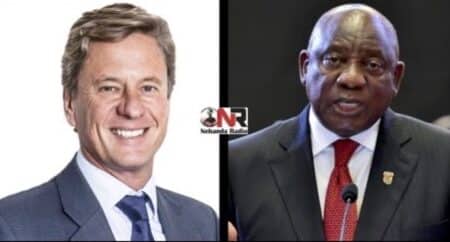It’s been almost a month since Rob Hersov climbed the stage at a BizNews event to denounce President Ramaphosa, his cabinet and the government in general, and the issue remains alive. That’s remarkable longevity for a news story of any description, let alone the comments of a businessman. This is the third time I’m returning to it (have a look here and here). In business terms, it’s been an investment that paid off handsomely.
This reflection is prompted by a piece on EWN by Yonela Diko. Amid various bits of bluster about Hersov’s character and motivations, he made an important point: businesspeople and politicians function in different spaces with different incentives. Here at least he is correct, and I take some pride in having said this some years ago. (At the time, I wrote: ‘many believe Cyril Ramaphosa’s business skills will be just what the country needs, should his presidential bid be successful.’)
Hersov, in this view, just doesn’t get it. ‘Hersov’, Diko writes, ‘even from a simple measure of the difficulties of his narrow world and business interests must appreciate how difficult it must be to manage multiple goals (one no more dominant than the other), multiple constituencies, a plethora of responsibilities, and the fact that politics is a realm of persuasion as opposed to power.’
I’d suggest that Diko gets things backwards. Hersov’s frustrations are not that he could do the work of governing or governance better than the incumbents. Watching the footage of his appearance at the BizNews conference, I’d say he made it abundantly clear that he had no political aspirations. What he had to say was that misgovernance is rife and the state is dysfunctional. It was not that he could do the job of governance ‘better’, – as Diko avers – but that those charged with doing so were doing so poorly. Disastrously in fact.
Hersov would hardly be alone in making that observation; poverty, unemployment, electricity, infrastructure, crime and so on and so on. Talk of South Africa in terms of a failed state is not uncommon. This is something that all of us – whether politicians or not, and I’d say especially those of us who are not politicians but are exposed to the consequences of their actions – have a vested interest in. Indeed, democratic theory is premised on the idea that those not in government have the right to be so heard. A constitutional democracy guarantees that even for a minority of one.
For a businessperson, the failure of the state to perform its own functions crashes tangibly onto factory floors and into boardrooms. If a businessperson is to be chastised for speaking out about the state of governance (though I don’t think such chastisement is warranted), perhaps a necessary corollary is to ask whether those in charge of the state comprehend how damaging their failings are to just about everyone else.
A thread that runs through this is the state of the governing party. Diko may be correct to claim that businesspeople do not generally make successful politicians, but then again, liberation movements have not shown themselves to be exemplars of successful governance. This has certainly not been the case in Southern Africa, and sadly, the record of the ANC has a great deal that speaks against it.
Bad policy for one thing. The attack on property rights through Expropriation without Compensation is inimical to investment, whether domestic of foreign. Empowerment policy imposes effective taxes on doing business. Labour market regulations disincentivise employment. Localisation distorts supply chains and make business that much harder and that much less competitive.
General dysfunction is another. This came out very clearly in the official enquiry into the riots that took place in July last year: the schisms and internal conflicts within the African National Congress were a threat to South Africa’s security.
More recently, the report of the Zondo Commission laid bare just how rancid the state has become and attributed this is no small measure to the ANC’s programme of cadre deployment. This, the report argued was both counter-constitutional and illegal.
There is very little to suggest any change of course. Indeed, the President has stoutly defended cadre deployment and will be using public funds – your taxes, gentle reader – to defend it in court.
I’d venture that where Diko is particularly at fault is his assertion about the imperative of ‘(managing) multiple goals (one no more dominant than the other), multiple constituencies, a plethora of responsibilities, and the fact that politics is a realm of persuasion as opposed to power.’
I struggle to reconcile that with the orientation of the ANC. Power – acquiring it, holding it, using it – seems to be its key preoccupation. Isn’t that the message in that hackneyed warcry ‘Amandla’?
More to the point, the ANC’s foremost constituency is itself. In this, it follows the liberation movement model. The party – or movement, however you wish to phrase it – represents an enlightened distillation of objective truth, a higher form of political consciousness. It does not so much represent people as embody them. Or rather, ‘the people’.
The state and all of society are seen as so many tools to further the party’s ambitions, whether in some sort of quasi-idealistic ideological sense, or in the material and venal sense of resourcing the party machine or keeping selected members in clover.
Needless to say, in this milieu considerations of actual governance – making things work, doing the workaday business of running the country – are of secondary importance if they feature at all. Political connections and political consciousness will invariably outweigh career competence and workplace conscientiousness.
Perhaps Hersov is insensitive to and uninformed about the arts of politics. But there’s not much to indicate that the ANC is much seized by the arts or importance of governance.

